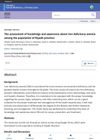 November 2023 in “Journal of plant nutrition and soil science”
November 2023 in “Journal of plant nutrition and soil science” Boron deficiency in maize affects leaf boron levels and nutrient uptake differently depending on root hair presence and soil type.
 October 2023 in “Journal of Family Medicine and Primary Care”
October 2023 in “Journal of Family Medicine and Primary Care” More awareness and education on iron deficiency anemia are needed in Riyadh.
 25 citations,
January 2017 in “International Journal of Trichology”
25 citations,
January 2017 in “International Journal of Trichology” Most Indian people with hair loss in the study lacked nutrients, especially iron.
[object Object]  15 citations,
October 2016 in “PubMed”
15 citations,
October 2016 in “PubMed” People with Telogen Effluvium often lack vitamin D, ferritin, and zinc.
180 citations,
October 2019 in “British journal of haematology” Early detection and treatment of iron deficiency in pregnancy are crucial for maternal and infant health.
146 citations,
September 2013 in “Advances in nutrition” Bariatric surgery can cause serious mineral deficiencies, requiring better patient education and monitoring.
15 citations,
January 2018 in “Indian Journal of Dermatology” Women with androgenetic alopecia have lower zinc and iron levels.
14 citations,
July 2022 in “Nutrients” Vitamin A is important for healthy skin and hair, influencing hair growth and skin healing, but UV light reduces its levels.
 December 2024 in “Nutrients”
December 2024 in “Nutrients” Skin, hair, and nail changes can help detect eating disorders early.
276 citations,
April 2003 in “Molecular endocrinology” Vitamin D is important for bones, hair, blood pressure, and breast development.
 68 citations,
January 2022 in “International Journal of Molecular Sciences”
68 citations,
January 2022 in “International Journal of Molecular Sciences” PCOS management includes lifestyle changes and medications, with ongoing research into repurposed drugs for better treatment options.
27 citations,
January 2015 in “International Journal of Trichology” The supplement helps improve hair growth and reduce hair shedding.
20 citations,
June 2020 in “Journal of Advanced Research” High-dose vitamin A and E with zinc improved blood sugar control and insulin function in diabetics, but may cause hair loss.
16 citations,
January 2017 in “DOAJ (DOAJ: Directory of Open Access Journals)” Low levels of vitamin B12 and ferritin are linked to early hair graying.
 10 citations,
July 2018 in “Our Dermatology Online”
10 citations,
July 2018 in “Our Dermatology Online” Some vitamins and minerals are important for preventing hair loss, but treating hair loss with them without a known deficiency is not proven effective.
 7 citations,
August 2021 in “Heliyon”
7 citations,
August 2021 in “Heliyon” Phyllotex™ extract was found to significantly promote hair growth and protect against hair loss.
 5 citations,
August 2017 in “The Journal of Clinical Psychiatry”
5 citations,
August 2017 in “The Journal of Clinical Psychiatry” Biotin may effectively treat hair loss caused by valproate medication.
 3 citations,
May 2018 in “Journal of nutritional health & food science”
3 citations,
May 2018 in “Journal of nutritional health & food science” Nutritional supplements can help manage hair loss and promote hair growth by strengthening hair roots and countering harmful effects of pollution, smoking, and deficiencies in vitamins and minerals.
 3 citations,
November 2021 in “Applied Microscopy”
3 citations,
November 2021 in “Applied Microscopy” Hair microscopy is a simple and cost-effective method to help diagnose systemic diseases in children.
 1 citations,
February 2024 in “Environmental health perspectives”
1 citations,
February 2024 in “Environmental health perspectives” Exposure to certain metals may worsen attention-related behaviors in adolescents, with stronger effects in females.
1 citations,
August 2022 in “Frontiers in Physiology” Finasteride may help treat kidney disease caused by a high-fat diet by reducing harmful toxins and improving gut bacteria.
 April 2024 in “Food science & nutrition”
April 2024 in “Food science & nutrition” Many displaced schoolchildren in Cameroon are malnourished, with high rates of thinness, stunting, underweight, and deficiencies in iron and protein.
 February 2024 in “Curēus”
February 2024 in “Curēus” A balanced diet with proteins, vitamins, and minerals is crucial for managing skin disorders.
 November 2023 in “International Journal of Trichology”
November 2023 in “International Journal of Trichology” No significant link between hair loss and iron or thyroid levels was found, but checking for deficiencies might still be useful.
 October 2023 in “Aesthetic Plastic Surgery”
October 2023 in “Aesthetic Plastic Surgery” Platelet-rich plasma treatment for hair loss may improve patients' quality of life.
 January 2022 in “Sustainable development goals series”
January 2022 in “Sustainable development goals series” The document concludes that significant investment in agricultural innovation is necessary to achieve global food security and nutrition.
181 citations,
December 2017 in “Trends in immunology” Intestinal intraepithelial lymphocytes are crucial for gut immunity and maintaining the mucosal barrier.
 56 citations,
August 2019 in “Clinical, Cosmetic and Investigational Dermatology”
56 citations,
August 2019 in “Clinical, Cosmetic and Investigational Dermatology” The document concludes that Telogen Effluvium is a hair loss disorder that can be assessed with the modified wash test and may be treated with clobetasol foam, with patient management being important.
54 citations,
June 2020 in “Pharmaceutics” New nanocarriers improve drug delivery for disease treatment.
[object Object]  30 citations,
January 2023 in “EFSA journal”
30 citations,
January 2023 in “EFSA journal” Adults should not consume more than 255 micrograms of selenium per day to avoid risk of hair loss and other side effects.



















